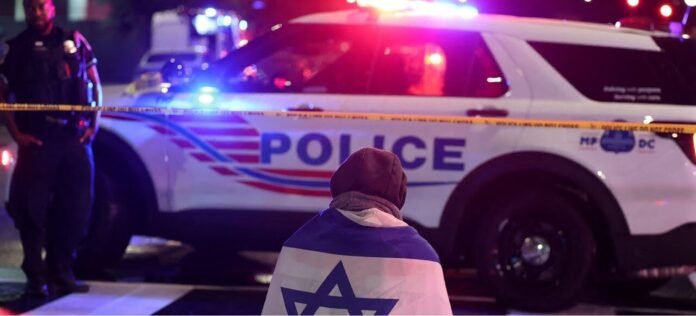Two Israeli diplomats were killed outside the Capital’s Jewish Museum as security gaps ignite urgent questions
Two Israeli Embassy staffers were fatally shot outside the Capital Jewish Museum in Washington, DC, in what FBI Director Kash Patel called an “act of terror.” The Israeli Embassy shooting claimed the lives of Yaron Lischinsky and Sarah Lynn Milgrim, a young couple attending an event at the museum when the attack occurred.
The incident has ignited fierce debate over the adequacy of security at the event, which did not feature any on-duty or off-duty Metropolitan Police Department officers, relying instead on private security personnel. Metropolitan Police Chief Pamela A. Smith confirmed during a Thursday press briefing that while private security was present, no MPD officers were assigned to the gathering.
The Capital Jewish Museum, a vital cultural institution in Washington, had not classified the event as a “special event,” meaning local and federal law enforcement did not deploy additional security resources. Washington Mayor Muriel Bowser explained that extra police presence is typically reserved for large-scale events or those with explicit threats. She noted the city provides grants to faith-based institutions, including the museum, to enhance security measures such as cameras and hardened access points.
Attorney General Pam Bondi, speaking outside the museum on Thursday morning, rejected suggestions of a security failure. She highlighted the swift law enforcement response following the shooting and praised the coordination between the FBI, MPD, the Bureau of Alcohol, Tobacco, Firearms and Explosives, and U.S. Marshals. “No one could have expected what happened last night,” Bondi said. “They were celebrating together at a beautiful event.”
Experts familiar with security at faith-based institutions stressed the need for heightened vigilance. John Cohen, former acting Homeland Security Undersecretary for Intelligence and Analysis and ABC News contributor, pointed out the current heightened threat environment against the Jewish community. He urged places of worship, cultural centres, and related venues to implement robust security measures for events, even when no explicit threat is known.
Former Secret Service Deputy Special Agent Derek Meyer added that private security teams typically supplement their protection with off-duty law enforcement for major events or during periods of unrest. He clarified that off-duty officers, working under private security licences, have the authority to detain suspects but hand over custody to on-duty police as soon as possible.
The suspected shooter, identified as Elias Rodriguez, 30, was taken into custody at the scene. Authorities believe he acted alone. During his arrest, Rodriguez reportedly shouted, “Free, free Palestine.” Investigators are examining a lengthy 980-word manifesto attributed to him, titled “Escalate For Gaza, Bring The War Home,” which calls for violence against Israelis and criticises U.S. government policies on Gaza. The FBI continues to verify the authenticity of these writings.
Attorney General Bondi described the moment she saw the victims’ bodies being removed from the scene as heartbreaking. “He was about to get engaged. He had an entire life ahead of him, and it was taken away,” she said. She condemned hate and vowed that the suspect would face the fullest extent of the law.
The attack has prompted increased security at the Israeli Embassy and Jewish sites nationwide. Bondi spoke with Israeli Prime Minister Benjamin Netanyahu and former U.S. President Donald Trump, both of whom expressed devastation over the tragedy. The attorney general emphasised a message of unity: “This is a day where we all need to come together, no matter our religion.” She shared a message of interfaith solidarity from the Muslim community, which reached out to Jewish leaders offering condolences.
Jewish communal organisations are now calling for more government funding and support to bolster security at their institutions. Cohen reiterated the importance of good intelligence and recognising early warning signs, both online and offline, to prevent future violence targeting vulnerable communities.
As Washington grieves the loss of two promising lives, the attack underscores the ever-present dangers faced by diplomats and faith-based communities. Security experts and officials alike are grappling with how to protect these institutions better in a climate of growing threats and rising antisemitism.
